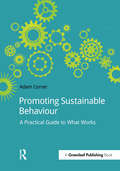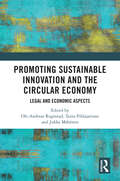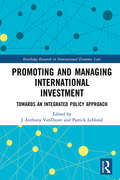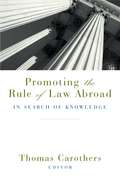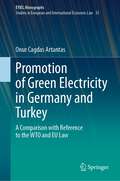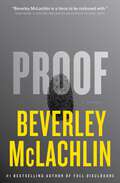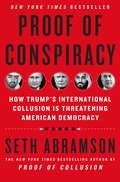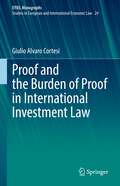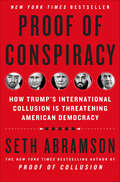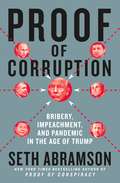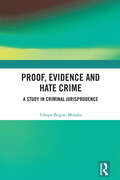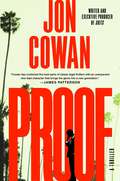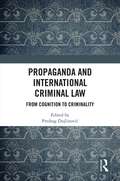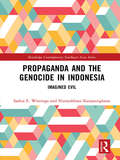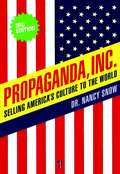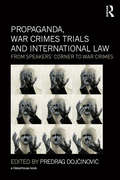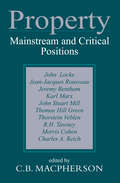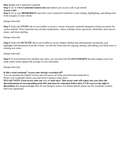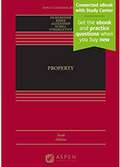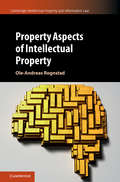- Table View
- List View
Promoting Sustainable Behaviour: A practical guide to what works
by Adam CornerPromoting sustainable behaviour is a critical part of society’s response to climate change. This short, practical book shows you how to build a sustainable behaviour campaign that works. There are more and less effective ways for businesses, NGOs and governments to encourage people to act in a more sustainable way, and some common pitfalls to avoid. By summarizing "what really works" and pulling out the most important take-home messages from the evidence base, this book contains all the tools you need to maximize the success of your sustainable behaviour initiative – in households, when commuting, in the workplace and beyond. By looking beyond individual behaviours to people’s sense of identity and values; by incorporating social signals that provide such important cues for our everyday behaviour; by pointing out strategies that attract (and keep) people’s interest; and by understanding how to break bad habits and create good ones, this guide offers the best chance of making a sustainable behaviour campaign work, to create a lasting change in behaviour.
Promoting Sustainable Innovation and the Circular Economy: Legal and Economic Aspects
by Ole-Andreas Rognstad, Taina Pihlajarinne and Jukka MähönenThe book explores the role of public market actors in sustainable and circular economy innovation and financing.The shift to a circular economy requires active innovation, alongside radical changes in law, finance and policy considerations, since regulation is often tightly connected with the assumption of a linear model of consumption. Finance is crucial in creating sustainable and circular economy markets and innovations: public finance is important from the perspective of seeing the state as an engine for promoting sustainable innovations, but private funds are also required. Legislative initiatives for promoting repairs have been proposed or adopted in the EU, US and in Australia, representing remarkable steps forward but still leaving many obstacles without legislative intervention. This book examines circular economy regulation and policy on a comprehensive, general level, as well as assessing the regulatory possibilities of promoting the right to repair. Promotion of circular economy innovations as well as changing the practices and changing consumer patterns towards a more comprehensive adoption of CE are discussed from perspectives of legal, social and moral norms. The book critically evaluates current legislative reforms and assesses existing barriers to the circular economy and innovation in intellectual property law, consumer law and competition law.Providing an in-depth analysis of this dynamic field, geared towards reconsidering both existing and prospective policies and regulatory regime, the book makes recommendations for solutions to legislative barriers. It is an indispensable resource for both researchers and practitioners working at the intersections of markets, innovations and sustainability.
Promoting Sustainable Innovations in Plant Varieties
by Mrinalini KochupillaiThis book develops the term 'Sustainable Innovations' and defines it on the basis of plant variety innovations that, by their very nature, (i) permit the in situ conservation of agrobiodiversity and genetic variability in diverse geographic and climatic conditions, (ii) do not exclude any potential innovators from the process of innovation, and thereby (iii) ensure that both formal and informal innovations can continue to take place in the generations to come (in both the developed and developing world). The book studies the Indian Plant Variety Protection Act, the UPOV Acts and associated agricultural policies from a legal, philosophical, historical and economic perspective with the aim of determining the means of promoting sustainable innovations in plant varieties and identifying laws, policies and practices that are currently acting as impediments to promoting the same.
Promoting and Managing International Investment: Towards an Integrated Policy Approach (Routledge Research in International Economic Law)
by J. Anthony VanDuzer Patrick LeblondThis book provides an overview of international investment policy and policy-making, drawing upon perspectives from law, economics, international business, and political science. International investment is a complex phenomenon with significant effects worldwide. Developing effective policies and strategies to attract investment in sufficient quantities and marshal it to contribute to sustainable development is a critical challenge for governments at all levels. This book’s interdisciplinary approach provides fresh insights into the mix of policy options available to governments seeking investment to support their country’s (or region’s) development. As well as identifying ways to effectively design, implement, and assess policies to attract foreign investment, it explores how to manage foreign investment’s effects. Various dimensions of international investment policy are discussed, including benefits and costs (economic, environmental, social, and political) of foreign investment, the significance of global value chains, state-owned enterprises and sovereign wealth funds, and the role of tax policy, investment promotion, and policy advocacy, location branding, investment treaties, and national security considerations. Through its contributions to a new interdisciplinary understanding of international investment policy-making, this book will benefit students and scholars working in areas such as international business, international economic law, international economics, development economics, international development, and international political economy as well as being a valuable resource for policy-makers.
Promoting the Rule of Law Abroad
by Thomas Carothers"Over the past decade, Carothers has established himself as the leading U.S. expert on democracy promotion. He is a powerful critic not only of the nuts-and-bolts of democracy assistance but also of U.S. grand strategy overall."-SAIS Review Promoting the rule of law has become a major part of Western efforts to spread democracy and market economics around the world. Yet, although programs to foster the rule of law abroad have mushroomed, well-grounded knowledge about what factors ensure success, and why, remains scarce. In Promoting the Rule of Law Abroad, leading practitioners and policy-oriented scholars draw on years of experience-in Russia, China, Latin America, Central and Eastern Europe, the Middle East, and Africa-to critically assess the rationale, methods, and goals of rule-of-law policies. These incisive, accessible essays offer vivid portrayals and penetrating analyses of the challenges that define this vital but surprisingly little-understood field. Contributors include Rachel Belton (Truman National Security Project), Lisa Bhansali (World Bank), Christina Biebesheimer (World Bank), Thomas Carothers (Carnegie Endowment), Wade Channell, Stephen Golub, and David Mednicoff (University of Massachusetts, Amherst), Laure-Hélène Piron (Overseas Development Institute), Matthew Spence (Yale Law School), Matthew Stephenson (Harvard Law School), and Frank Upham (NYU School of Law).
Promoting the Rule of Law in Post-Conflict States
by Laura GrenfellIn most post-conflict states, a strong level of legal pluralism is the norm, particularly in regions of Africa and Asia where between eighty and ninety per cent of disputes are resolved through non-state legal mechanisms. The international community, in particular the United Nations, persistently drives the re-establishment of the rule of law in war-torn areas where, traditionally, customary law is prevalent. Laura Grenfell traces the international community's evolving understanding of the rule of law in such regions, and explores the implications of strong legal pluralism for the rule-of-law enterprise. Using the comparative examples of two unique case studies, South Africa and Timor-Leste, Promoting the Rule of Law provides insight into the relationship between the rule of law and legal pluralism. Alongside these studies, the book offers a comprehensive introduction to the conceptual framework of the rule of law in the context of approaches taken by the international community.
Promotion of Green Electricity in Germany and Turkey: A Comparison with Reference to the WTO and EU Law (European Yearbook of International Economic Law #33)
by Onur Cagdas ArtantasThe global energy economy is undergoing a profound transformation, yielding several pivotal objectives. Foremost among these is mitigating greenhouse gas emissions and toxic pollutants. Another essential goal involves promoting more sustainable economies, thereby curbing material consumption and reducing our reliance on resource extraction. Further priorities include fostering energy security and economic resilience by reducing dependence on external energy sources. All these aims overlap in one common policy: accelerating the renewable energy capacity deployment. Complementing this paradigm shift is the complete electrification of economic activities and households, resulting in the need to incentivize green electricity generation. In this context, this book undertakes a comprehensive exploration of the regulatory framework underpinning the advancement of green electricity. After reviewing the political and economic dimensions, it offers an exhaustive analysis of ongoing developments in four legal domains: The WTO, EU, Germany, and Turkey. Furthermore, the book presents a legal analysis of the intricate interplay between the WTO and EU law coupled with the German and Turkish models. It focuses on the most topical and relevant issues, including the effect of the ongoing energy crisis on state aid for green electricity in the EU; WTO case law on local content requirement components of the promotion schemes; the intricate legal, economic, and political challenges that accompany Germany’s Energiewende and its phasing out of coal and nuclear energy; and Turkey’s regulatory endeavors to bolster its energy self-sufficiency strategy. Following a thorough examination encompassing theoretical, regulatory, and comparative aspects, the book moves beyond the applicable legal framework to make concrete proposals on the future design of green electricity promotion in Germany and Turkey so as to facilitate a rapid but socially equitable energy transition by incentivizing economic efficiency.
Proof (A Jilly Truitt Novel #3)
by Beverley McLachlinFrom the former Chief Justice of Canada and #1 bestselling author of Full Disclosure comes a razor-sharp thriller featuring defense attorney Jilly Truitt as she defends a high-profile mother accused of kidnapping her own child.Jilly Truitt has always put her job as a criminal defense lawyer first, but becoming a new mother has changed her priorities. For the first time in her career, she&’s taking some long-overdue time away from her firm and the day-to-day grind of cases, enjoying the quiet delights of motherhood. Then the daughter of celebrity pop star Trist Jones goes missing and his ex-wife, Katie, is charged with kidnapping. Everyone from the police to the media believe Katie is guilty—her reputation was ripped to shreds in the tabloids during their divorce and subsequent custody battle. Call it mother&’s intuition, but Jilly has her doubts. Katie&’s whole life was about being a mother, and she and Trist were very public about their problems conceiving, shining a spotlight on their use of a surrogate. After everything she went through to have a child, Katie claims that she would never do anything to hurt her daughter, and she begs Jilly to take her case. Jilly agrees, but Katie&’s prospects don&’t look good. Police have found a witness who says he saw Katie with Tess the afternoon she disappeared, and they are close to giving up the search. The best chance Jilly has of clearing Katie&’s name is to find the missing girl. But as the weeks go by, the police begin to suspect that Tess might be dead. With the threat of a murder charge hanging over Katie&’s head, Jilly must find the real kidnapper and save Tess before it&’s too late.
Proof Of Conspiracy: How Trump's International Collusion Is Threatening American Democracy
by Seth AbramsonIn late 2015, convicted pedophile, international dealmaker, and cooperating witness in Special Counsel Robert Mueller’s Russia investigation George Nader convened a secret meeting aboard a massive luxury yacht in the Red Sea. Nader pitched Saudi Crown Prince Mohammed bin Salman, Emirati Crown Prince Mohammed bin Zayed, Egyptian President Abdel Fattah el-Sisi and other Middle Eastern leaders a plan for a new pro-U.S., pro-Israel alliance of Arab nations that would fundamentally alter the geopolitics of the Middle East while marginalizing Iran, Qatar, and Turkey. To succeed, the plan would need a highly placed American politician willing to drop sanctions on Russia so that Vladimir Putin would in turn agree to end his support for Iran. They agreed the perfect American partner was Donald Trump, who had benefited immensely from his Saudi, Emirati, and Russian dealings for many years, and who, in 2015, became the only U.S. presidential candidate to argue for a unilateral end to Russian sanctions and a far more hostile approach to Iran. So begins New York Times bestselling author Seth Abramson’s explosive new book Proof of Conspiracy: How Trump's International Collusion Threatens American Democracy, a story of international intrigue whose massive cast of characters includes Israeli intelligence operatives, Russian oligarchs, Saudi death squads, American mercenary companies, Trump’s innermost circle, and several members of the Trump family as well as Trump himself—all part of a clandestine multinational narrative that takes us from Washington, D.C. and Moscow to the Middle Eastern capitals of Riyadh, Abu Dhabi, Jerusalem, Cairo, Tehran, and Doha. Proof of Conspiracy is a chilling and unforgettable depiction of the dangers America and the world now face.
Proof and the Burden of Proof in International Investment Law (European Yearbook of International Economic Law #24)
by Giulio Alvaro CortesiInternational investment arbitration has been dubbed the “Antarctica” of international procedural law. This book explores international investment arbitration (IIA) using the searchlight of comparative analysis. Further, it provides answers to several questions, such as the role of ICJ judgments and WTO decisions as a source of inspiration for how proof and the burden of proof are approached in IIA. By investigating various evidence-related issues, the book also sheds light on overarching questions including the role of IIA as a subsystem of international economic law.
Proof of Conspiracy: How Trump's International Collusion Is Threatening American Democracy
by Seth AbramsonInstant New York Times Bestseller"A richly documented indictment of power and corruption." —Kirkus Reviews Through diligent research, Seth Abramson exposes a story that U.S. media has largely missed: a pre-election geopolitical conspiracy involving Saudi Arabia, the United Arab Emirates, Israel, and Russia that sought to put Trump in the White House—and succeeded. In late 2015, convicted pedophile, international dealmaker, and cooperating witness in Special Counsel Robert Mueller’s Russia investigation George Nader convened a secret meeting aboard a massive luxury yacht in the Red Sea. Nader pitched Saudi Crown Prince Mohammed bin Salman, Emirati Crown Prince Mohammed bin Zayed, Egyptian President Abdel Fattah el-Sisi and other Middle Eastern leaders a plan for a new pro-U.S., pro-Israel alliance of Arab nations that would fundamentally alter the geopolitics of the Middle East while marginalizing Iran, Qatar, and Turkey. To succeed, the plan would need a highly placed American politician willing to drop sanctions on Russia so that Vladimir Putin would in turn agree to end his support for Iran. They agreed the perfect American partner was Donald Trump, who had benefited immensely from his Saudi, Emirati, and Russian dealings for many years, and who, in 2015, became the only U.S. presidential candidate to argue for a unilateral end to Russian sanctions and a far more hostile approach to Iran.So begins New York Times bestselling author Seth Abramson’s explosive new book Proof of Conspiracy: How Trump's International Collusion Threatens American Democracy, a story of international intrigue whose massive cast of characters includes Israeli intelligence operatives, Russian oligarchs, Saudi death squads, American mercenary companies, Trump’s innermost circle, and several members of the Trump family as well as Trump himself—all part of a clandestine multinational narrative that takes us from Washington, D.C. and Moscow to the Middle Eastern capitals of Riyadh, Abu Dhabi, Jerusalem, Cairo, Tehran, and Doha. Proof of Conspiracy is a chilling and unforgettable depiction of the dangers America and the world now face.
Proof of Corruption: Bribery, Impeachment, and Pandemic in the Age of Trump
by Seth AbramsonIn the third volume of his Proof series, New York Times bestselling author Seth Abramson takes readers on a deep dive into the Ukraine scandal, revealing it to be more sinister, complex, and transnational than previously thought. Abramson’s research on Trump administration corruption positions the Ukraine scandal as the foreseeable culmination of years of clandestine machinations involving scores of players, from Beijing to Budapest, Ankara to Caracas, Warsaw to Jerusalem, Kyiv to Riyadh, and Moscow to D.C. While many know about the July 2019 telephone call that ignited the Ukraine scandal, most don’t know about the concurrent attempts by members of Trump’s inner circle to take over Ukraine’s national gas company and bolster dangerous pro-Kremlin Ukrainian oligarchs—moves that would have benefited Putin and destabilized Ukraine’s government and economy.In Beijing, Trump’s dealings with the Chinese government not only enriched him and his family, but also culminated in him successfully seeking 2020 election interference from Xi Jinping in the form of closely held information about Joe Biden. In Venezuela, many of the actors involved in the Ukraine scandal engaged in similarly secretive, Kremlin-friendly negotiations that undermined U.S. policy. In Syria and Iraq, Trump’s personal indebtedness to autocrats in Turkey, Israel, Saudi Arabia, and the UAE cost untold lives. And Abramson brings the story back to an increasingly fractured and depleted United States, where the COVID-19 pandemic exposes the staggering domestic consequences of the Trump administration’s foreign machinations.In Proof of Corruption, Seth Abramson lays bare Trump’s decades-long pattern of corruption. This globe-spanning narrative is an urgent warning about the unprecedented threat posed by a corrupt president and his administration.
Proof, Evidence and Hate Crime: A Study in Criminal Jurisprudence
by Tshepo Bogosi MosakaProof is the property of a disputed fact being established inferentially from an extant fact. This book explicates the structural components of this phenomenon in the context of hate crimes across various jurisdictions around the world. It departs from the orthodox conception of evidence and proof as being a general, value-neutral (or non-normative) and epistemic subject, and offers a relativistic conception of this area of law. The core argument is that proof is both semantically and methodologically determined by three conditions of materiality, process and probativity. This argument is then justified by the context-specific application of this relativistic theory of proof to hate crimes. This theoretical application of proof is sustained throughout the book using multiple examples and illustrations of hate crimes around the world. The discussion, both at the level of proof and hate crimes, while focusing on the grounds of race, religion and ethnicity specifically, is framed in jurisprudential, cross-jurisdictional and interdisciplinary terms. The book will be of interest to academics and researchers working in the areas of criminal law, legal philosophy and procedural law.
Proof: A Thriller
by Jon Cowan&“Cowan has combined the best parts of classic legal thrillers, with an unexpected new lead character that brings the genre into a new generation.&” —JAMES PATTERSON From a writer and executive producer of Suits comes a riveting and gritty legal thriller about murder, cover-ups, redemption, and Los Angeles—perfect for fans of #1 bestselling authors John Grisham and Scott Turow.As a disgraced lawyer with a drinking problem that he doesn&’t view as a problem, Jake West is coasting on what&’s left of his charm and money. He used to be the kind of lawyer who could convince anyone of anything—until he decided to take on his father&’s biggest client and prove his dad was corrupt. Now Jake finds himself almost at rock bottom, and that&’s before his ex-best friend is murdered and Jake is accused of the crime. In a desperate bid to save himself, Jake must sober up and search for the real killer, whom he suspects might be hidden in one of the case files of his father&’s illustrious law firm. As he delves into a labyrinth of lies and corruption, Jake teams up with an eclectic group of equally broken people as they all must skirt the law in order to find the proof he needs…no matter the personal or professional cost.
Propaganda and International Criminal Law: From Cognition to Criminality
by Predrag DojčinovićThis book addresses the conceptual and evidentiary issues relating to the treatment of propaganda in international criminal law. Bringing together an interdisciplinary range of scholars, researchers and legal practitioners from Africa, Australia, Europe and the United States, the book provides an in-depth analysis of the nature, position and role of the concept of propaganda in mass atrocity crimes trials. A sequel to the earlier Propaganda, War Crimes Trials and International Law: From Speakers’ Corner to War Crimes (Routledge, 2011) this book is the first to synthesize the knowledge, procedures and methods of international criminal law with the social cognitive sciences. Including a comprehensive overview of the most relevant case law, jurisprudence and scientific studies, the book also offers a series of practical insights and strategies for both academics and legal professionals. An invaluable resource for those working in the area of international criminal law, this book will also be of interest to academics, practitioners and students with relevant interests in legal theory, politics, linguistics and psychology.
Propaganda and the Genocide in Indonesia: Imagined Evil (Routledge Contemporary Southeast Asia Series)
by Saskia E. Wieringa Nursyahbani KatjasungkanaIn Indonesia, the events of 1st October 1965 were followed by a campaign to annihilate the Communist Party and its alleged sympathisers. It resulted in the murder of an estimate of one million people – a genocide that counts as one of the largest mass murders after WWII – and the incarceration of another million, many of them for a decade or more without any legal process. This drive was justified and enabled by a propaganda campaign in which communists were painted as atheist, hypersexual, amoral and intent to destroy the nation. To date, the effects of this campaign are still felt, and the victims are denied the right of association and freedom of speech. This book presents the history of the genocide and propaganda campaign and the process towards the International People’s Tribunal on 1965 crimes against humanity in Indonesia (IPT 1965), which was held in November 2015 in The Hague, The Netherlands. The authors, an Indonesian Human Rights lawyer and a Dutch academic examine this unique event, which for the first time brings these crimes before an international court, and its verdict. They single out the campaign of hate propaganda as it provided the incitement to kill so many Indonesians and why this propaganda campaign is effective to this day. The first book on this topic, it fills a significant gap in Asian Studies and Genocide Studies.
Propaganda, Inc.: Selling America's Culture to the World
by Herbert I. Schiller Michael Parenti Nancy SnowAn eye-opening overview of American cultural policy fully updated through the end of the Bush presidency, Propaganda, Inc. reveals how the United States Information Agency became a bureaucracy deeply distrustful of dissent, and one-way in its promotion of American corporate interests overseas.Nancy Snow spent two years inside the Agency, and here provides an insider's account of its crooked relationship to corporate interests and war--a must-read for those concerned with American propaganda and the war on terror.
Propaganda, War Crimes Trials and International Law: From Speakers' Corner to War Crimes
by Predrag DojFirst Published in 2012. Propaganda, War Crimes Trials and International Law addresses the emerging jurisprudence and international law concerning propaganda in war crimes investigations and trials. The role of propaganda in the perpetration of atrocities has emerged as a central theme in the war crimes trials in the past century. The Nuremburg trials initially, and the International Criminal Tribunal for the former Yugoslavia and the International Criminal Tribunal for Rwanda currently, have all substantially contributed to the development of international law in this respect. Investigating and exploring the areas between lawful and unlawful propaganda, they have dealt with specific mechanisms and consequences of the phenomenon within the perspective and framework of their international legal mandates. But the cultural codes and argots through which propaganda operates have vexed international courts struggling to assign responsibility to the instigators of mass crimes, as subtle, but potentially fatal, communications often remain undetected, misinterpreted or even dismissed as entirely irrelevant. With contributions from leading international scholars and legal practioners, Propaganda, War Crimes Trials and International Law pursues a comparative approach to this problem: providing an overview of the current state of the theory of propaganda in the social sciences; exploring this theory in the legal analysis of war crimes and related proceedings; and, finally, offering a study of the prosecution of propaganda-related crimes in international law, and the newly emerging jurisprudence of war crimes propaganda cases.
Property
by C. B. MacphersonThe legitimate role of the state in relation to property and the justification of property institutions of various kinds are matters of increasing concern in the modern world. Political and social theorists, jurists, economists, and historians have taken positions for and against the property institutions upheld in their time by the state, and further dehate seems inevitable. This book brings together ten classic statements which set out the main arguments that are now appealed to and places them in historical and critical perspective.The extracts presented here - all substantial - are from Loeke, Rousseau, Bentham, Marx, Mill, Green, Veblen, Tawney, Morris Cohen, and Charles Reich. A note hy the editor at the head of each extract highlights the arguments in it and relates it to the time at which it was written. Professor Macpherson's introductory and concluding essays expose the roots of some common misconceptions of property, identify current changes in the concept of property, and predict future changes. Macpherson argues that a specific change in the concept (which now appears possible) is needed to rescue liberal democracy from its present impasse.Property is both a valuable text on a crucial topic in political and social theory and a significant contribution to the continuing debate
Property & Liability Insurance Principles, 5th Edition
by Mary Ann Cook Arthur L FlitnerProperty & Liability Insurance Principles
Property (Aspen Casebook Ser.)
by Lior Jacob Strahilevitz Gregory S. Alexander Jesse Dukeminier James E. Krier Michael S. SchillJesse Dukeminier’s trademark wit, passion, and human interest perspective has made Property, now in its Ninth Edition, one of the best—and best loved—casebooks of all time. A unique blend of authority and good humor, you’ll find a rich visual design, compelling cases, and timely coverage of contemporary issues. In the Ninth Edition, the authors have created a thoughtful and thorough revision, true to the spirit of the classic Property text.
Property (Aspen Casebook Ser.)
by Lior Jacob Strahilevitz Gregory S. Alexander Jesse Dukeminier Michael H. Schill James E. KrierJesse Dukeminier’s trademark wit, passion, and human interest perspective has made Property, now in its Tenth Edition, one of the best—and best loved—casebooks of all time. A unique blend of authority and good humor, you’ll find a moveable feast of visual interest, compelling cases, and timely coverage of contemporary issues. In the Tenth Edition, the authors have created a thoughtful and thorough revision, true to the spirit of the classic Property text.
Property (Eighth Edition)
by Jesse DukeminierJesse Dukeminier's trademark wit, passion, and human interest perspective has made Property, now in its Eighth Edition, one of the best--and bestloved--casebooks of all time. A unique blend of authority and good humor, you'll find a moveable feast of visual interest, compelling cases, and timely coverage of contemporary issues. In the Eighth Edition, the authors--along with new co-author Lior Jacob Strahilevitz--have created a thoughtful and thorough revision, true to the spirit of the late Jesse Dukeminier. Features:Thoroughly updated throughout with the expansion of many topics and the introduction of new topics. Extended material on intellectual property with new cases on patents,copyright, and trademarks. New material on exclusion, abandonment, and destruction, with new cases and discussion. Introduction of a comprehensive treatment of the mortgage crisis with new cases and notes on foreclosure, proposals to reform the legal system and proposals to revamp housing finance. etc.
Property (Examples & Explanations): Fourth Edition
by Barlow Burke Joseph SnoeThis book discusses in detail the fundamental definitions, rules, and concepts covered in Property courses.
Property Aspects of Intellectual Property (Cambridge Intellectual Property and Information Law #46)
by Ole-Andreas RognstadFor many years, there have been discussions about whether intellectual property (IP) is really property. The property concept, particularly when used in transnational and international concepts, remains somewhat elusive. Here, Ole-Andreas Rognstad comprehensively discusses the use of the property metaphor in relation to IP in a transnational perspective. Rognstad gives an overview of main aspects of the IP/property interface, notably the justification and the structuring of the rights and intellectual property rights as assets. Moreover, he highlights the importance of distinguishing between these aspects, even though they are closely linked to each other. The book takes a transnational approach, dealing with recent developments in European human/fundamental rights law and international investment law, helping readers to understand the practical implications of the IP/property interface. This will be valuable reading for academics, practitioners and policy makers working in the area of IP, and lawyers and philosophers interested in the property debate.
